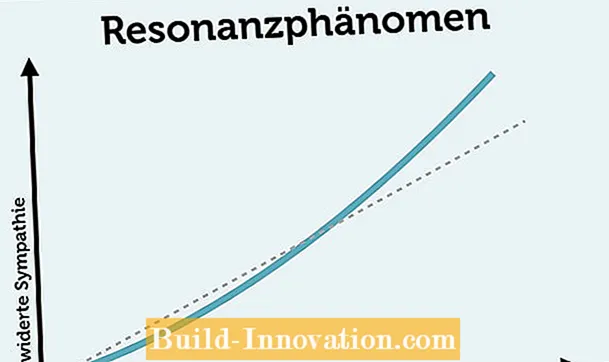Deprivation: Recognizing and avoiding significant deficiencies

Content
- Definition: what is deprivation?
- Forms of deprivation
- The consequences of deprivation are drastic
- Voluntarily chosen privations versus torture
- Preventing deprivation in everyday life
There are needs that are vital for us and our wellbeing. There is talk of deprivation, we are deprived of these needs. So experience a real withdrawal. Everyone knows the feeling: if you are constantly woken up by noisy neighbors in the middle of the night, you will experience sleep deprivation. As long as the deficiency is only of a temporary nature, this is harmless. But if something like this grows into deprivation, well-being and happiness in life take massive damage. In short, it's time to take action. What forms of deprivation there are, their consequences and what you can do to prevent them ...
Definition: what is deprivation?
Deprivation means something like withdrawal or robbery in German. It is derived from the Latin "deprivare" (= to rob). Deprivation could be described synonymously with “loss, failure” or “deficiency”. This deficiency can be of an intellectual or emotional nature, but it can equally well describe a deprivation of food and water. That is, the living conditions of a person are such that the most basic vital and psychological needs are not satisfied over a long period of time.
Forms of deprivation
Different forms of deprivation can be distinguished, the most common of which are:
- Mental deprivation
Also known as emotional deprivation, it means a lack of emotional, loving attention. This can be seen in children who grew up in children's homes or who were in hospital for a long time. An emotionally disturbed bond with the parents, for example through the absence of a parent or through withdrawal of love, can lead to hospitalism and depression. - Sensory deprivation
If a person hardly receives external stimuli because all sensory organs such as eyes, ears, mouth, nose and skin are shielded, stimulus depletion or stimulus deprivation occurs. Experiments with newborn animals have shown that sensory deprivation can result in deafness or blindness. It is known as a form of torture (so-called "white torture", since no external injuries are visible) against prisoners. Sensory deprivation can lead to hallucinations. - Social deprivation
Social deprivation is when there is a partial or complete loss of social interactions. In contrast to a situation that is (subjectively) perceived as loneliness, a person often has hardly any social contact due to spatial isolation. This can affect inmates in solitary confinement; individual asylum seekers separated from family and friends in accommodation as well as senior citizens in nursing homes and various other members of society.
The consequences of deprivation are drastic
In any case, deprivation has drastic consequences for people, regardless of the type of deficiency. For example, how important various stimuli are for the development of a healthy person in body and soul, experiments with deprivation in the eyes of animals show.
To do this, you blindfolded one or both eyes of a cat for a period of two months, and a monkey for a period of six months. This happened at a critical (postnatal) point in a certain development phase.
If both eyes were closed, this led to blindness. If there was deprivation in one eye, the previously closed eye remained functionless for life even after the experiments. The decisive factor for these results was that the experiments were carried out on newborn animals. In adults, comparable experiments did not have these effects.
Such experiments with people are - especially in childhood - ethically unjustifiable. However, there are enough historical examples that show the consequences of withdrawal. One of the most famous experiments shows deprivation in various ways.
In the 13th century, Emperor Friedrich II had some babies taken away from their mothers. He was looking for the original language and wondered whether the children, when they grew up free from external influences, spoke Hebrew (considered the oldest language), Greek, Latin or Arabic, or the language of their birth parents.
The wet nurses were instructed to give the children milk, to wash and care for them, but not to receive any attention. The outcome of the experiment was fatal, all the children died, the following sentence is passed down:
They could not live without the clapping of hands and the happy cutting of faces and the endearing words of their wet nurses.
Several forms of deprivation can be recognized here, both psychological, sensory and social, but also linguistic deprivation due to the lack of address. Not every withdrawal of love in childhood has such consequences.
On the other hand, it is also known from so-called wolf children or the Kaspar Hauser syndrome that the respective children grew up isolated from other people. They therefore show different behavior compared to normally socialized people.
Such psychological deprivation can, for example, result in great distrust and fear of commitment towards other people as well as further phobias even in adulthood.
Voluntarily chosen privations versus torture
Deficiency is never perceived positively. It is a deviation from the target state. Therefore, deprivation is rated as torture when it is consciously used. Unsurprisingly, deprivation of food and water is seen as torture. But even less drastic interventions can cause long-term damage to humans.
It is known that people need social contact with other people. This is exactly what they are denied when they are put in solitary confinement. There is a withdrawal of external stimuli from other people. Their mere presence, but also conversations, are numerous stimuli.
This is particularly important in an environment such as a prison or a psychiatric ward, as there is an exceptional situation here due to the deprivation of liberty or restricted freedom of movement.
All the more surprising at first glance when such a deficiency is caused by those affected themselves. However, this is not about some form of masochism. Rather, the targeted deprivation arises from a specific motivation.
For example when people are fasting. If the background was originally religious, nowadays weight loss and health aspects are in the foreground. A study by the University of Bern comes to the result: Although positive effects in terms of weight loss and high blood pressure can be recorded, there are too few long-term observations to be considered completely uncritical from a therapeutic point of view.
On the one hand, a stronger drive and a better mood could be determined in the twelve volunteers. At the same time, the test subjects showed greater irritability and tension. In addition to other emotional effects such as poor concentration, physical symptoms due to the deprivation such as:
- Body odor
- a headache
- nausea
- Poor eyesight
As early as the 1950s, American scientists were able to prove that permanent food deprivation can cause typical hunger symptoms, but also emotional, cognitive and physical disorders.
Preventing deprivation in everyday life
In childhood, people have little influence on the way they live. In terms of experience and survival, they are helplessly at the mercy of their parents or guardians. It looks different in adulthood. Not everyone must have had glaring experiences of deprivation right away. Nevertheless, there may be a risk of deprivation due to certain circumstances. Not only prison inmates or people in closed psychiatric hospitals are affected.
In working life, for example, students have a higher risk of deprivation when they come to a completely foreign city as a freshman and have to organize themselves completely for the first time in their lives. It is similar for expats who go to work abroad and have to grapple with linguistic challenges and a differently functioning bureaucracy. The danger of isolation and loneliness is also given to workers in the home office to a greater extent. To prevent - especially emotional - deprivation, therefore our tips:
- Plan steps
The start of studies or a job in a new city does not fall from the sky. It is foreseeable that previous social contacts can suffer as a result, provided that the distance confuses previous processes or makes them impossible. There are many offers for students, such as first-semester campaign weeks, which serve to get to know each other. Get involved in seminars or group work, work in a student council or voluntary activities bring you together with people. - Meet people
Friendships change over the course of life, but they don't necessarily have to fall asleep. Think about how you can maintain existing contacts (regular phone calls or video chats, holidays together). Make an effort to make new contacts at the same time, for example by going out for a beer with colleagues in the evening, or by registering in the club or the gym. Cooking and dance courses will also bring you together with new people. - Build in movement
Exercise has several benefits - you meet new people when you join a sports club. But you can also benefit from doing sports on your own, such as jogging or walking. The happiness hormones contribute to a better attitude towards life and physical well-being. Or you can get yourself a dog: It guarantees more exercise and helps against loneliness.



